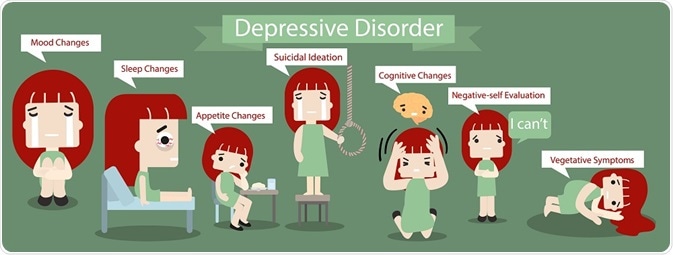Major Depressive Disorder (MDD), also known as clinical depression, is a psychiatric condition that affects more than 15.7 million adults and approximately 3 million adolescents (aged 13 to 17 years) in the USA each year.
 24cdesign | Shutterstock
24cdesign | Shutterstock
The World Health Organization estimates that more than 300 million are affected by depression globally. Depression may be caused by adverse environmental experiences (e.g. loss of a loved one), biochemical imbalances (e.g. low serotonin levels), or neurological responses to stressful stimuli (e.g. overactivity of the HPA axis).
While MDD can present in multiple forms, signs and symptoms can vary between individuals and may be difficult to differentiate from other forms of depression.
Diagnostic criteria of MDD
According to the 5th edition of the Diagnostic and Statistical Manual of Mental Disorders (DSM-5), a person diagnosed with MDD meets at least five of the following conditions for a period of at least two weeks:
- Depressed mood most of the day
- Loss of interest or pleasure (anhedonia)
- Significant weight loss or weight gain
- Insomnia or hypersomnia almost everyday
- Observable psychomotor agitation (feelings of restlessness)
- Fatigue or loss of energy
- Feelings of worthlessness or excessive guilt
- Reduced capacity to concentrate or think
- Recurrent thoughts of death or suicidal tendencies
It is essential to note that for an individual to be diagnosed with MDD, they must experience one of the first two symptoms plus at least four of the other symptoms. Clinical depression significantly affects the daily behavior and personality of an individual and this is usually noticed by collegues, family members and people close to the patient.
Functional changes
People with clinical depression experience significant functional changes in most of their social and personal commitments. Functionality would refer to any form of activity that enables an individual to take care of themselves and establish independence in accomplishing simple day-to-day activities. A person with clinical depression would have markedly lower functional abilities, especially in terms of personal care.
Studies have shown that individuals with MDD are less likely to care for personal grooming and hygiene. They would also most likely lack the motivation and capacity to attend school or report to work. These functional changes are significantly observable and would facilitate grave limitations in terms of the individual’s capability to follow their usual day-to-day routine.
Suicidal tendencies
Recurrent thoughts of death or suicidal ideation is an important, but not necessary sign for the diagnosis of clinical depression. Affected persons may attempt suicide, and, physicians should treat anyone with suicidal thoughts as a medical emergency that requires immediate attention and support.
In clinical practice, physicians and psychologists assess for the escalation of depressive and suicidal thoughts by asking a person how they are likely to act on their thoughts. It is important to distinguish between passive thoughts of “wanting to die” from the more serious immediate risk associated with having plans for committing suicide.
Anhedonia
Another significant marker of major depressive disorder is significant loss of interest or pleasure. Medically termed anhedonia, the condition is marked by low excitement and happiness in association with activities that would typically bring joy and satisfaction to the patient. Thus, a person experiencing a depressive state may have reduced capacity to seek pleasure or enjoyment on various social and environmental encounters. The DSM-5 notes that either anhedonia or depressed mood are required for a diagnosis of MDD.
Further Reading
Last Updated: Feb 28, 2019